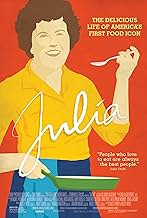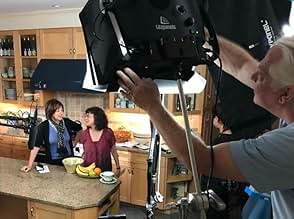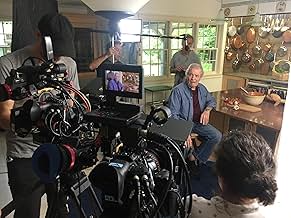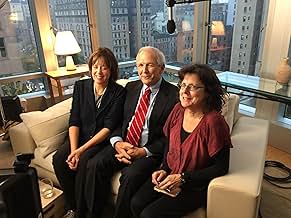IMDb-BEWERTUNG
7,6/10
1314
IHRE BEWERTUNG
Julia erzählt die Geschichte der legendären Kochbuchautorin und des Fernseh-Superstars, die das Denken der Amerikaner über Essen, Fernsehen und sogar über Frauen verändert hat.Julia erzählt die Geschichte der legendären Kochbuchautorin und des Fernseh-Superstars, die das Denken der Amerikaner über Essen, Fernsehen und sogar über Frauen verändert hat.Julia erzählt die Geschichte der legendären Kochbuchautorin und des Fernseh-Superstars, die das Denken der Amerikaner über Essen, Fernsehen und sogar über Frauen verändert hat.
- Auszeichnungen
- 12 Nominierungen insgesamt
Julia Child
- Self
- (Archivfilmmaterial)
Empfohlene Bewertungen
I'm surprised that on 18 Dec 2021 I'm only the third person to review this movie. And the first two reviews read very much as if they were written by the pr company handling the marketing of this film. Unlike them, I don't think this is the greatest thing since sliced bread (which wasn't so great), but it's a very fine documentary that does a solid job of presenting the life and achievements of a very interesting American woman.
It starts out not slow, but somewhat bloated. There is too much unnecessary filler, and too many people exaggerating both how bad American home cooking was in the 1950s and 60s and how much Child changed Americans' way of life.
Child grew up in an America where the wealthy, such as her family, had cooks, so that the wife did not herself get involved with daily meal preparation. The rest of American housewives did not, by and large, see cooking as a chance to be creative and develop their own personalities.
My mother, for example, only relied on frozen tv dinners as a last resort, unlike what you see in the tv ads from the 50s in this movie. She, like most American housewives of the 50s, felt they were shortchanging their husbands and especially children if they did not provide a home-cooked meal every night. I still make some of her recipes, and they are still good.
Child's real innovation was not, therefore, that she convinced American housewives to actually cook dinner: they were already doing that. She introduced the French idea of cooking as an art. Housewives certainly took pride in presenting good meals to their families before her, but the range of what they cooked was more limited, and the recipes were not that fancy. It was pretty much meat, potatoes (or pasta), and veggies. The highest praise was that it was filling.
Child gave women-middle and upper-class women, at least-the idea that there could be something intellectually rewarding about preparing a variety of different dishes. Going past meatloaf could be rewarding, even if hubbie was perfectly satisfied with it.
Once we get past that part of the movie and into Child's life, it's really pretty much all gravy. I was amazed at all the photos and home movies the staff found, some even of intimate moments. (I gather Child's husband, Paul, set up cameras in their homes to take pictures of them together.) The talking heads in the center of the movie know what they're saying, speak authoritatively, and don't go off on dithyrambs of encomia.
If you want real detail on how Child wrote her first, best-known book, Mastering the Art of French Cooking, you'll need to read her book about her life in France, which is a great read. 90 minute documentaries can't get into that sort of detail.
On the other hand, this documentary does a nice job of covering other, non-culinary aspects of her life, such as her support of gay and abortion rights.
Good use is made of both diaries and letters.
In short, a very fine movie.
It starts out not slow, but somewhat bloated. There is too much unnecessary filler, and too many people exaggerating both how bad American home cooking was in the 1950s and 60s and how much Child changed Americans' way of life.
Child grew up in an America where the wealthy, such as her family, had cooks, so that the wife did not herself get involved with daily meal preparation. The rest of American housewives did not, by and large, see cooking as a chance to be creative and develop their own personalities.
My mother, for example, only relied on frozen tv dinners as a last resort, unlike what you see in the tv ads from the 50s in this movie. She, like most American housewives of the 50s, felt they were shortchanging their husbands and especially children if they did not provide a home-cooked meal every night. I still make some of her recipes, and they are still good.
Child's real innovation was not, therefore, that she convinced American housewives to actually cook dinner: they were already doing that. She introduced the French idea of cooking as an art. Housewives certainly took pride in presenting good meals to their families before her, but the range of what they cooked was more limited, and the recipes were not that fancy. It was pretty much meat, potatoes (or pasta), and veggies. The highest praise was that it was filling.
Child gave women-middle and upper-class women, at least-the idea that there could be something intellectually rewarding about preparing a variety of different dishes. Going past meatloaf could be rewarding, even if hubbie was perfectly satisfied with it.
Once we get past that part of the movie and into Child's life, it's really pretty much all gravy. I was amazed at all the photos and home movies the staff found, some even of intimate moments. (I gather Child's husband, Paul, set up cameras in their homes to take pictures of them together.) The talking heads in the center of the movie know what they're saying, speak authoritatively, and don't go off on dithyrambs of encomia.
If you want real detail on how Child wrote her first, best-known book, Mastering the Art of French Cooking, you'll need to read her book about her life in France, which is a great read. 90 minute documentaries can't get into that sort of detail.
On the other hand, this documentary does a nice job of covering other, non-culinary aspects of her life, such as her support of gay and abortion rights.
Good use is made of both diaries and letters.
In short, a very fine movie.
I love Julia. Everyone loves Julia.
It's too bad that the director made it a political piece for today, when Julia was not trying to make a political stand for the year 2021. All she wanted was to inspire cooks 1912-2004. Please let cooking be about food, not politics.
It's too bad that the director made it a political piece for today, when Julia was not trying to make a political stand for the year 2021. All she wanted was to inspire cooks 1912-2004. Please let cooking be about food, not politics.
"Julia"
Julia was more than a cook. She was a cultural force. That summation of cooking and TV phenomenon Julia Child begins an exploration into how one of America's most unique television-era and literary figures jump-started a food revolution. "Julia" brings to life the legendary cookbook author and television superstar who changed the way Americans think about food, television, and even about women. Using never-before-seen archival footage, personal photos, first-person narratives, and cutting-edge, mouth-watering food cinematography, the film traces Julia Child from her well-to-do childhood in Pasadena, California, to the 'Far East' during 'World War II', where as an OSS worker she met her future husband Paul Child. One of the few women to attend Paris 'Le Cordon Bleu' school, Julia Child became a bestselling author in her 50s thanks to the seminal cookbook 'Mastering The Art Of French Cooking'.
An appearance on Boston public television led to her mega-successful public TV show 'The French Chef', decades of celebrity, and a dedication to teaching Americans the joys of cooking. "Julia" is the story of a woman conquering the male-dominated food world, but it's also a feminist love story; Paul Child served as his wife's fiercest advocate and loudest cheerleader. "Julia" unwraps how one of the modern era's most entertaining and vibrant personalities sparked a re-evaluation of the culinary arts and a love of food in the United States as she seasoned her days with romance, curiosity, and a recipe for living life to the fullest. It's the empowering story of a woman who found her purpose, and her fame, at 50, and took America along on the whole delicious journey.
The love of cooking is now central to American culture, with an appreciation for the artistry of preparing delicious cuisine filling 'Instagram' accounts, 'Twitter' feeds, airwaves, blogs, and bookshelves. It's a complete generational shift from the way Americans used to see food, which in the 'Mad Men' era of 60-plus years ago ran the gamut from blood-red meat and potatoes to unimaginative processed food. That's, until one woman changed American palettes; Julia Child brought continental recipes and an excitement about the experience of cooking to kitchens across the United States with her bestselling 1961 book 'Mastering The Art Of French Cooking', and then brought her playful and unique personality and her love of food into homes with her groundbreaking syndicated program 'The French Chef', which ran from 1963 to 1973. "Julia" shows how the standard at the time for local television programs was low-budget academic shows, with stiff and academic hosts seemingly. We're going to be comprehensive here and do a magnum opus of French cooking as it had never been done before. It was a big, serious book by a woman, an encyclopedia of food from another culture.
The book meant a lot to people and symbolized something in the culture and especially to American women. And when she bursts onto the airwaves in the 1960s, it was a time people thought there was a certain way a woman on TV was supposed to be, they should have a quiet voice, be demure and petite, preferably blonde, certainly young, and either a sex bomb or a quote-unquote housewife type with every hair in place. Julia was the opposite of all of that, and it was because she became a television star by happenstance. She was a real human being with a great wacky personality, and it turns out, people really liked that. She brought a very French philosophy that food is sensual, and eating meals isn't a boring thing you have to do; it's one of the great pleasures of the world. That's a fairly new idea for a lot of Americans. We take it for granted now that we've all of these cooking shows, but before Julia, there wasn't much. She was unique as a personality in the '70s, and then in the '80s, as cable television took off and the 'Food Network' and other channels began to see people responding to cooking, the genre grew. It cut across generations to people who aspired to cook and who enjoyed watching other people cook. In 2004, Julia Child succumbed to kidney failure, passing away at the age of 91.
When you think about the great food personalities on TV now, Julia's idea about cooking is very much a part of it. Food is not just a series of steps to prepare a meal. It's about making a festive, pleasurable experience for us all to share. The emotional impact of food is huge. When you're looking at food, it's as a combination of all the senses: The visual, how you're smelling different ingredients, the way they dissolve on your taste buds, the texture of it. When you're cooking, it's about anticipation and understanding how you're building the meal. Through the macro food photography, the film brings the audience up close and personal in order for them to see the steam, see the bubbles bursting in gravy, see mmmmmmmm slowed down, gives us inspiration. It's amazing how alive those food sections feel, partly because of the sound design. Something about seeing those dishes being made just bring to mind a delightful, rolling river.
Written by Gregory Mann.
Julia was more than a cook. She was a cultural force. That summation of cooking and TV phenomenon Julia Child begins an exploration into how one of America's most unique television-era and literary figures jump-started a food revolution. "Julia" brings to life the legendary cookbook author and television superstar who changed the way Americans think about food, television, and even about women. Using never-before-seen archival footage, personal photos, first-person narratives, and cutting-edge, mouth-watering food cinematography, the film traces Julia Child from her well-to-do childhood in Pasadena, California, to the 'Far East' during 'World War II', where as an OSS worker she met her future husband Paul Child. One of the few women to attend Paris 'Le Cordon Bleu' school, Julia Child became a bestselling author in her 50s thanks to the seminal cookbook 'Mastering The Art Of French Cooking'.
An appearance on Boston public television led to her mega-successful public TV show 'The French Chef', decades of celebrity, and a dedication to teaching Americans the joys of cooking. "Julia" is the story of a woman conquering the male-dominated food world, but it's also a feminist love story; Paul Child served as his wife's fiercest advocate and loudest cheerleader. "Julia" unwraps how one of the modern era's most entertaining and vibrant personalities sparked a re-evaluation of the culinary arts and a love of food in the United States as she seasoned her days with romance, curiosity, and a recipe for living life to the fullest. It's the empowering story of a woman who found her purpose, and her fame, at 50, and took America along on the whole delicious journey.
The love of cooking is now central to American culture, with an appreciation for the artistry of preparing delicious cuisine filling 'Instagram' accounts, 'Twitter' feeds, airwaves, blogs, and bookshelves. It's a complete generational shift from the way Americans used to see food, which in the 'Mad Men' era of 60-plus years ago ran the gamut from blood-red meat and potatoes to unimaginative processed food. That's, until one woman changed American palettes; Julia Child brought continental recipes and an excitement about the experience of cooking to kitchens across the United States with her bestselling 1961 book 'Mastering The Art Of French Cooking', and then brought her playful and unique personality and her love of food into homes with her groundbreaking syndicated program 'The French Chef', which ran from 1963 to 1973. "Julia" shows how the standard at the time for local television programs was low-budget academic shows, with stiff and academic hosts seemingly. We're going to be comprehensive here and do a magnum opus of French cooking as it had never been done before. It was a big, serious book by a woman, an encyclopedia of food from another culture.
The book meant a lot to people and symbolized something in the culture and especially to American women. And when she bursts onto the airwaves in the 1960s, it was a time people thought there was a certain way a woman on TV was supposed to be, they should have a quiet voice, be demure and petite, preferably blonde, certainly young, and either a sex bomb or a quote-unquote housewife type with every hair in place. Julia was the opposite of all of that, and it was because she became a television star by happenstance. She was a real human being with a great wacky personality, and it turns out, people really liked that. She brought a very French philosophy that food is sensual, and eating meals isn't a boring thing you have to do; it's one of the great pleasures of the world. That's a fairly new idea for a lot of Americans. We take it for granted now that we've all of these cooking shows, but before Julia, there wasn't much. She was unique as a personality in the '70s, and then in the '80s, as cable television took off and the 'Food Network' and other channels began to see people responding to cooking, the genre grew. It cut across generations to people who aspired to cook and who enjoyed watching other people cook. In 2004, Julia Child succumbed to kidney failure, passing away at the age of 91.
When you think about the great food personalities on TV now, Julia's idea about cooking is very much a part of it. Food is not just a series of steps to prepare a meal. It's about making a festive, pleasurable experience for us all to share. The emotional impact of food is huge. When you're looking at food, it's as a combination of all the senses: The visual, how you're smelling different ingredients, the way they dissolve on your taste buds, the texture of it. When you're cooking, it's about anticipation and understanding how you're building the meal. Through the macro food photography, the film brings the audience up close and personal in order for them to see the steam, see the bubbles bursting in gravy, see mmmmmmmm slowed down, gives us inspiration. It's amazing how alive those food sections feel, partly because of the sound design. Something about seeing those dishes being made just bring to mind a delightful, rolling river.
Written by Gregory Mann.
Julia Child was such a larger than life person that it's no surprise that she has had a theatrical film (JULIE & JULIA) and a current TV series (HBO's Julia) made about her in the years since her passing. JULIA is a feature documentary that sort of bridges the gap between those two projects.
Directed by RGB filmmakers Julie Cohen and Betsy West JULIE paints a pretty clear picture of Child's life story. Like RGB, this plays very much as an authorized biography (Child's books and her foundation are credited) so don't expect too much in the way of deep critique; Although it is mentioned that Child wasn't the greatest in sharing credit with her co-authors on her breakthough book, Mastering The Art Of French Cooking. Child was also seen as slow to accept social progress and modern cuisine.
Child (who was also a local hero in Boston where her PBS show originated) is seen as a lively presence who was both driven by her evangelizing over her cooking and a devoted wife. Indeed, JULIA is really two love stories: with her husband, Paul Child and with French Cooking (well, maybe three - Butter!).
Directed by RGB filmmakers Julie Cohen and Betsy West JULIE paints a pretty clear picture of Child's life story. Like RGB, this plays very much as an authorized biography (Child's books and her foundation are credited) so don't expect too much in the way of deep critique; Although it is mentioned that Child wasn't the greatest in sharing credit with her co-authors on her breakthough book, Mastering The Art Of French Cooking. Child was also seen as slow to accept social progress and modern cuisine.
Child (who was also a local hero in Boston where her PBS show originated) is seen as a lively presence who was both driven by her evangelizing over her cooking and a devoted wife. Indeed, JULIA is really two love stories: with her husband, Paul Child and with French Cooking (well, maybe three - Butter!).
By far the best documentary on Julia to date. Julia was such an influence on the culinary culture and that was highlighted. Julia Childs was such a phenomenal woman and this documentary confirmed that! There were more 'fillers' than I would have like to see. I personally feel they could have added a few more facts or footage but overall the story was well told. There were a lot of amazing food shots throughout the film that made me want to go and try to prepare what I saw (LOL), but I guess that was the point. The story itself was very inspirational and uplifting. I appreciate the honesty of the documentary as well. Julia's friends were pretty candid on the type of woman she was.
Wusstest du schon
- WissenswertesJulia was the eldest of three siblings and at 6' 3" the shortest. John, second eldest, was 6' 4" and Dorothy, the youngest, was 6' 5".
Top-Auswahl
Melde dich zum Bewerten an und greife auf die Watchlist für personalisierte Empfehlungen zu.
- How long is Julia?Powered by Alexa
Details
Box Office
- Bruttoertrag in den USA und Kanada
- 399.811 $
- Eröffnungswochenende in den USA und in Kanada
- 18.010 $
- 14. Nov. 2021
- Weltweiter Bruttoertrag
- 493.080 $
- Laufzeit1 Stunde 35 Minuten
- Farbe
- Sound-Mix
Zu dieser Seite beitragen
Bearbeitung vorschlagen oder fehlenden Inhalt hinzufügen



























